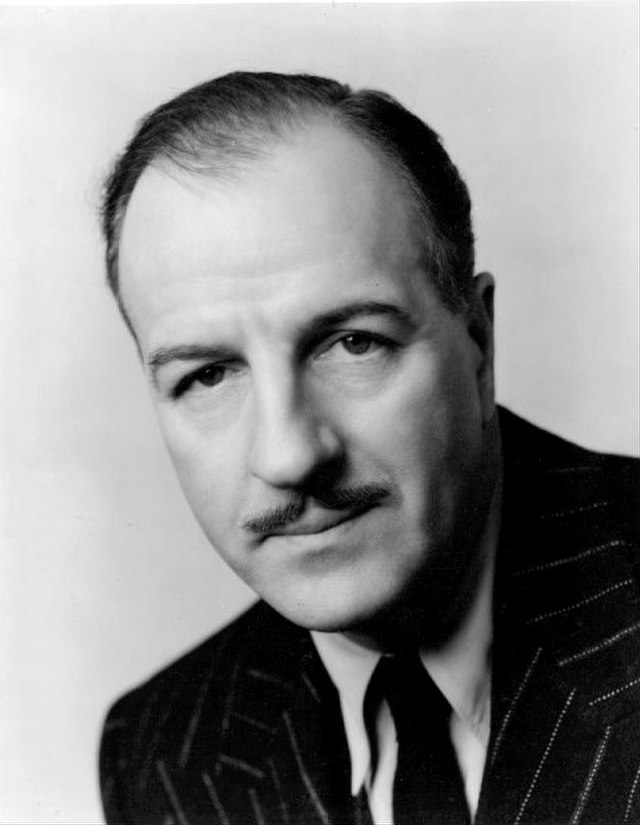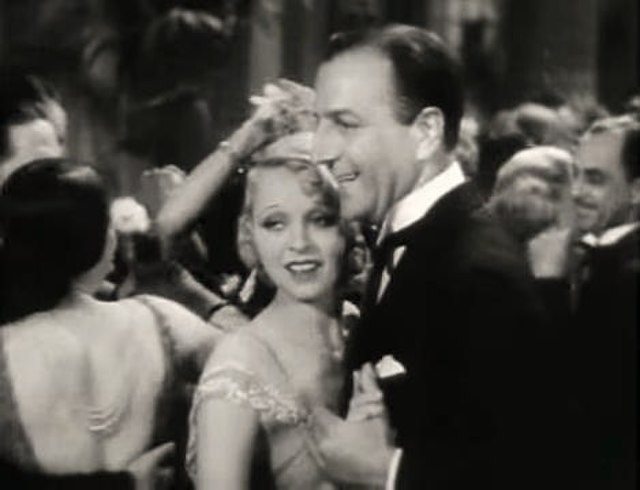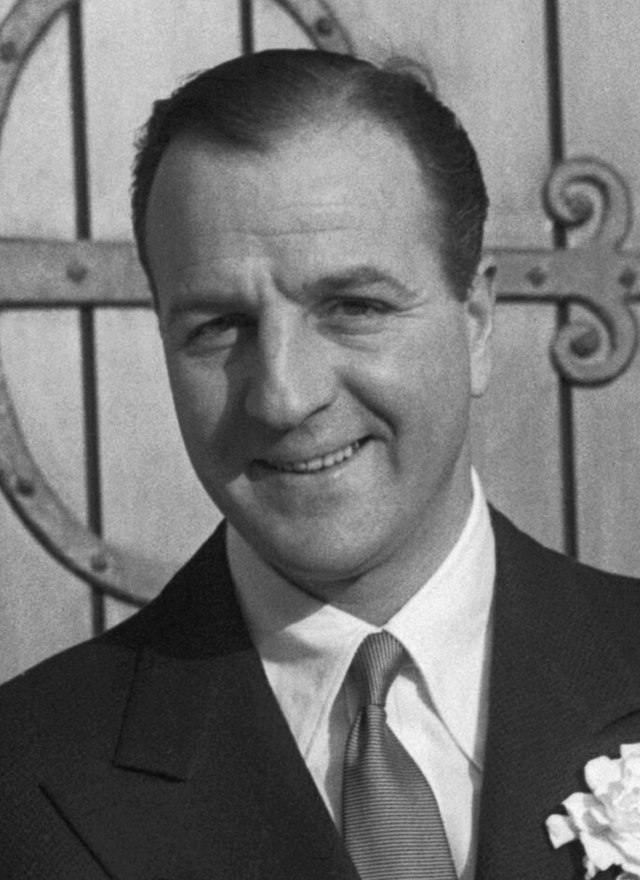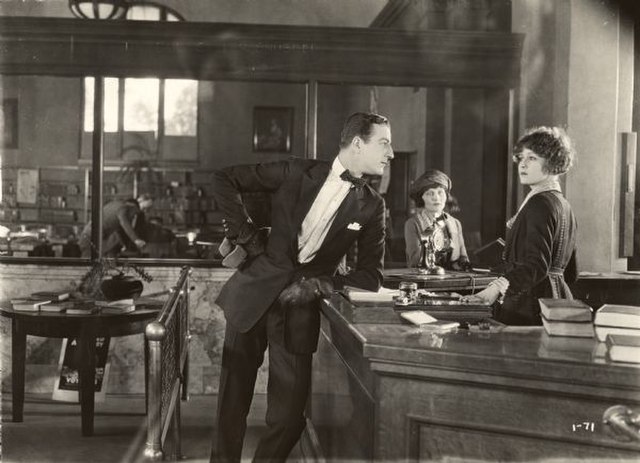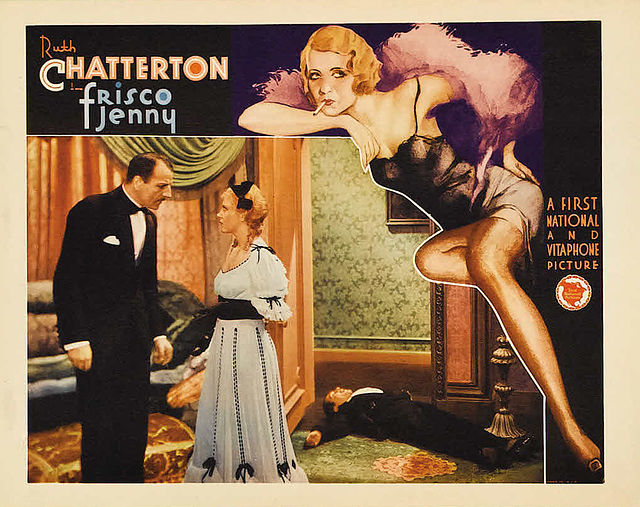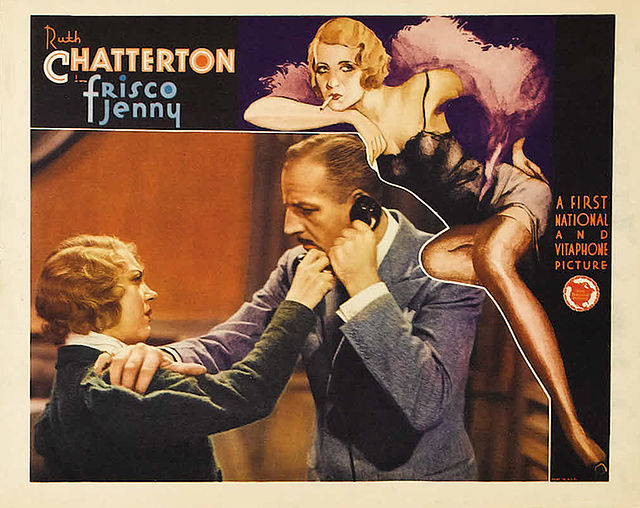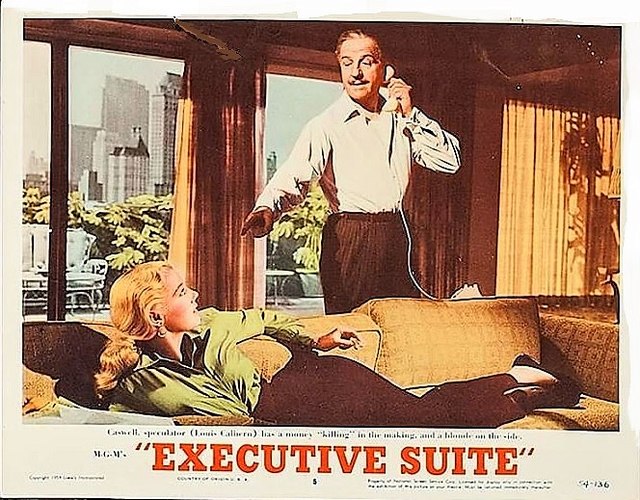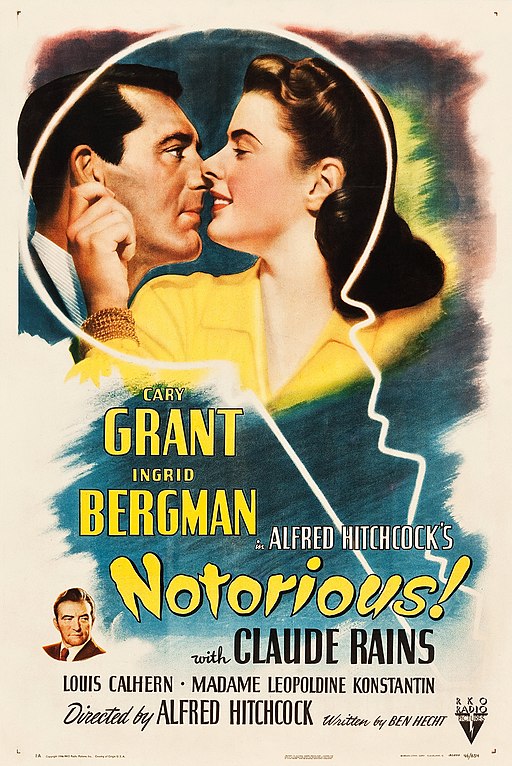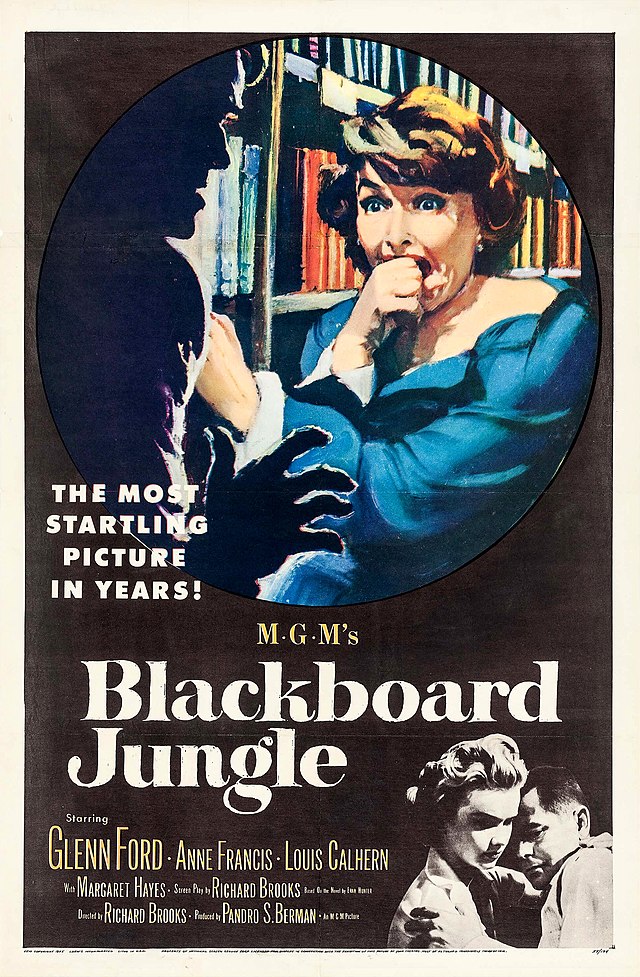Louis Calhern
back| Full Name | Carl Henry Vogt |
| Stage Name | Louis Calhern |
| Born | February 19, 1895 |
| Birthplace | Brooklyn, New York, USA |
| Died | May 12, 1956 |
| Buried | Nara, Nara Prefecture, Japan |
| Married to | Hollywood Forever Cemetery, Los Angeles, California, USA |
| Children | Ilka Chase (married in 1926, divorced in 1927) - Julia Hoyt (married in 1927, divorced in 1932) - Natalie Schafer (married in 1933, divorced in 1942) - Marianne Stewart (married in 1946, divorced in 1955) |
| Notable films | Tha Asphalt Jungle (1950) - Julius Caesar (1953) - Duck Soup (1933) - Notorious (1946) - The Prisoner of Zenda (1952) - High Society (1956) |
Louis Calhern
The Gravitas Actor
Louis Calhern was a distinguished American character actor known for his commanding voice and authoritative presence. Born in Brooklyn and raised in St. Louis, Calhern began his career in theater before transitioning to silent films in the 1920s.
His deep, resonant voice made him a standout in talkies, often cast as lawyers, judges, or dignitaries.
Calhern’s stage role as Oliver Wendell Holmes Jr. in The Magnificent Yankee further showcased his versatility. He was married four times but had no children.
Related
Louis Calhern (1895 – 1956)
Biography and Movie Career
Louis Calhern, born Carl Henry Vogt on February 19, 1895, in Brooklyn, New York, was the son of German immigrants. Shortly after his birth, his family relocated to St. Louis, Missouri, where he was raised. His father worked as a tobacco dealer, and young Carl grew up in a modest household. Calhern, who would later become known for his resonant voice and authoritative presence, was drawn to the stage from an early age, influenced by the local theater scene in St. Louis.
Calhern attended high school in St. Louis, where he was introduced to acting. His early performances in school plays captivated him, and he developed a passion for the theater. After high school, he joined a touring theatrical troupe, where he began honing his craft. This exposure to acting solidified his career path, and he decided to pursue acting professionally, adopting the stage name Louis Calhern.
Path Towards Success
Calhern’s career began in the silent film era of the 1920s, a time when actors transitioned from the stage to the burgeoning medium of cinema. His stage experience and natural acting ability earned him roles in silent films, where he worked steadily throughout the decade. However, it was the transition to sound films that truly highlighted his talents. Calhern's deep, commanding voice became one of his most significant assets, making him a natural fit for roles that required gravitas and authority.
In the 1930s, Calhern became a familiar face in Hollywood, often cast in supporting roles that capitalized on his ability to portray dignified or villainous characters. He worked alongside some of the most prominent stars of the time, appearing in films such as Duck Soup (1933) with the Marx Brothers, where he played a pivotal supporting role. His ability to embody a wide range of characters made him a sought-after character actor.
The 1940s saw Calhern continuing to build his reputation in the film industry. He appeared in notable films such as Notorious (1946), directed by Alfred Hitchcock, where he played a minor but memorable role. His versatility as an actor allowed him to move seamlessly between film genres, from comedies to dramas, always leaving a lasting impression with his performances.
Breakthrough and Acclaim
Calhern's breakthrough role came with the 1950 film The Asphalt Jungle, directed by John Huston. In this classic crime drama, Calhern played Alonzo D. Emmerich, a corrupt lawyer who becomes entangled in a heist gone wrong. His portrayal of Emmerich was both nuanced and powerful, earning him critical acclaim and solidifying his status as one of Hollywood’s most reliable character actors. The role showcased his ability to convey complex emotions, from desperation to authority, often within the same scene.
Following the success of The Asphalt Jungle, Calhern took on one of the most iconic roles of his career: Julius Caesar in the 1953 film adaptation of Shakespeare’s play, directed by Joseph L. Mankiewicz. His performance was lauded by critics, and he was nominated for an Academy Award for Best Actor in a Supporting Role. Calhern's portrayal of Caesar was marked by a blend of regal authority and human vulnerability, capturing the essence of the historical figure. The film remains a significant part of his legacy.
Personal Life and Marriages
Louis Calhern’s personal life was as dramatic as his screen roles. He was married four times, each marriage reflecting the turbulent nature of his off-screen life:
- Ilka Chase (1926-1927): Calhern's first marriage was to actress and writer Ilka Chase. The marriage was short-lived, lasting only a year. Chase was known for her wit and sophistication, but the marriage ended in divorce.
- Julia Hoyt (1927-1932): His second marriage was to actress Julia Hoyt. This union lasted longer but ultimately also ended in divorce. Hoyt was a well-known Broadway actress, and the couple's busy careers likely contributed to their separation.
- Natalie Schafer (1933-1942): Calhern’s third marriage was to Natalie Schafer, best known for her role as Mrs. Howell on the TV show Gilligan’s Island. This marriage lasted nearly a decade, but it, too, ended in divorce. Schafer and Calhern remained on good terms after their separation.
- Marianne Stewart (1946-1955): His final marriage was to actress Marianne Stewart. They were married for almost a decade, but like his previous marriages, this one ended in divorce. Stewart was also involved in the entertainment industry, which may have played a role in their eventual separation.
Despite his multiple marriages, Calhern did not have any children. His personal life, marked by romantic entanglements and separations, was often overshadowed by his professional achievements.
Passions and Interests
Outside of his acting career, Louis Calhern had a passion for literature and the arts. He was an avid reader and often found solace in books, a habit he cultivated throughout his life. His intellectual pursuits and his love for Shakespeare were evident in his career choices, such as his role in Julius Caesar. Calhern was also known to be a private person, enjoying the quiet of his home life when not on set or on stage. His colleagues often described him as a thoughtful and introspective individual, traits that contributed to his ability to portray complex characters.
Final Years and Death
In the mid-1950s, Louis Calhern continued to work in films and on the stage, maintaining a steady presence in Hollywood. However, his career was cut short by his untimely death. While filming The Teahouse of the August Moon in Japan in 1956, Calhern suffered a fatal heart attack. He was 61 years old at the time of his death. His sudden passing came as a shock to the film community and his fans.
Calhern's body was returned to the United States, where he was buried at the Hollywood Forever Cemetery in Los Angeles, California. His final film, High Society (1956), was released posthumously, adding a poignant note to his storied career.
Louis Calhern left behind a legacy as a distinguished character actor who could bring depth and complexity to a wide range of roles. His performances in films like The Asphalt Jungle and Julius Caesar remain memorable, demonstrating his talent for embodying both authority and vulnerability. Calhern's contribution to Hollywood's Golden Age is remembered fondly by film historians and classic movie enthusiasts. His work continues to be celebrated for its intelligence, subtlety, and the commanding presence he brought to every role.
10 Things to Know about Louis Calhern:
Analysis of Louis Calhern’s Acting Style
Louis Calhern was a versatile character actor whose presence and skills made him a memorable figure in both Hollywood films and theater. His acting style was marked by a combination of gravitas, subtlety, and a commanding presence that allowed him to play a wide range of roles, from dignified authority figures to morally complex characters.
Commanding Voice and Presence
One of Louis Calhern’s most distinctive attributes was his rich, resonant voice, which naturally lent itself to portraying characters of authority and influence. His deep, clear voice had a certain gravitas that was ideal for roles that required a sense of command and dignity. This vocal quality made him a favorite for roles such as judges, lawyers, politicians, and military officers, where a sense of control and power was essential.
Calhern’s physical presence also contributed to his authority on screen. He had a tall, imposing stature, often dressed in formal or elegant attire that reinforced the seriousness or importance of his characters. Even in scenes where he was not speaking, his posture and demeanor conveyed a sense of command, making his presence felt.
Subtlety and Understated Nuance
Unlike some actors of his era who favored melodramatic or exaggerated expressions, Calhern’s approach was more restrained and nuanced. He was adept at conveying emotion and intention with a subtle shift in his eyes, a slight change in his tone, or a minor adjustment in his posture. This understated approach allowed him to portray complex characters with multiple layers of personality and motive, making them more realistic and relatable.
In his role as Alonzo D. Emmerich in The Asphalt Jungle, for example, Calhern masterfully depicted a corrupt lawyer whose calm exterior masks deep-seated fear and desperation. His performance was not overly dramatic; instead, it was marked by a slow unraveling of his character’s inner turmoil. This subtlety made his characters appear more genuine and their actions more believable.
Versatility Across Genres
Calhern’s acting style was adaptable, allowing him to transition smoothly between different genres, including drama, comedy, and even musical films. In comedies, such as the Marx Brothers' Duck Soup, Calhern demonstrated his ability to handle comedic timing and playfulness, often playing the "straight man" to the more outrageous characters around him. His deadpan delivery and the serious demeanor contrasted sharply with the absurdity of the situation, enhancing the comedy.
In dramas and more serious films, Calhern brought depth and realism to his roles. His ability to convey a wide range of emotions, from stern authority to vulnerability, allowed him to portray characters who were multifaceted. In Shakespearean roles, such as his portrayal of Julius Caesar, Calhern's delivery was measured and thoughtful, reflecting a deep understanding of the text and the character's complexities.
Embodying Moral Ambiguity
Many of Calhern’s most memorable roles involved characters who existed in morally grey areas. He had a knack for portraying individuals who were outwardly respectable but internally conflicted or corrupt. His characters often wrestled with ethical dilemmas or hid dark secrets beneath a veneer of propriety. This capacity to embody moral ambiguity made him a compelling presence on screen, as audiences could sense the underlying tension and conflict within his characters.
For instance, in Julius Caesar, Calhern’s portrayal of Caesar was not just as a powerful leader but also as a man whose ambition and decisions brought about his downfall. He brought out the human side of historical and literary figures, showing their vulnerabilities and flaws, making them more relatable and tragic.
Mastery of Classic and Theatrical Techniques
Calhern's background in theater significantly influenced his film performances. He had a strong understanding of classical acting techniques, which involved precise diction, controlled physical movements, and a deep engagement with the character’s psychology. His theatrical training allowed him to handle complex dialogue, particularly in adaptations of stage plays or literary works. He was skilled at making Shakespearean dialogue sound natural and compelling, as seen in his portrayal of Julius Caesar.
His ability to project emotions to the audience, while maintaining a naturalistic style, was a testament to his training and experience on the stage. This theatrical grounding also made him adept at sustaining a performance through lengthy takes and monologues, ensuring his characters' presence was felt throughout a scene.
Transformation Through Characterization
Although Calhern often played characters within a certain archetype—authority figures, intellectuals, or corrupt individuals—he differentiated each role with distinct characterizations. His approach involved subtle changes in his vocal delivery, body language, and facial expressions, which gave each character a unique identity. This skill in characterization allowed him to avoid being typecast, as he brought something new to each role, even if they shared similar attributes.
For example, his portrayal of the corrupt lawyer Emmerich in The Asphalt Jungle was different from his role as the principled Justice Holmes in The Magnificent Yankee. In the former, his character was more shifty and desperate, with a hint of guilt and impending doom, whereas, in the latter, he exuded wisdom, warmth, and integrity.
A Sense of Dignity and Elegance
Regardless of the role, there was a certain elegance and dignity to Calhern’s performances. He carried himself with a poise that added to the believability of his characters as individuals of status or intellect. Even when playing morally dubious characters, he maintained a sense of dignity, which made his characters more complex and tragic rather than outright villainous.
His elegant demeanor and refined acting style were well-suited to the sophisticated, polished environment of classic Hollywood films, where actors often had to exude a sense of class and refinement. This quality helped Calhern stand out as an actor who could bring a touch of class to every role, making him a favorite for roles requiring a distinguished presence.
Conclusion
Louis Calhern’s acting style was a blend of authority, subtlety, versatility, and depth. His ability to bring a commanding presence to the screen while maintaining an air of subtlety and nuance made him a standout character actor in Hollywood’s Golden Age. He could navigate different genres and character types with ease, leaving a lasting impression in every role he undertook. Calhern’s work remains a testament to the craft of acting, demonstrating how a skilled performer can bring complexity and humanity to every character, no matter how large or small the role.
Awards and Recognition:
Louis Calhern, known for his distinguished presence and versatility as an actor, received several awards and recognition throughout his career. While he may not have accumulated a large number of accolades, his work was nonetheless respected and appreciated within the film industry, particularly during the height of his career in the 1940s and 1950s. Here is a comprehensive overview of the awards and recognition Louis Calhern received:
Academy Award Nominations
Academy Award for Best Actor in a Supporting Role (1954)
- Film: Julius Caesar (1953)
- Role: Julius Caesar
- Recognition: This was the most significant nomination of Louis Calhern's career. His portrayal of Julius Caesar in the film adaptation of Shakespeare’s play earned him critical acclaim and an Oscar nomination. His performance was noted for its commanding presence and nuanced interpretation of the historical figure, making it a standout in his filmography. Although Calhern did not win the award, this nomination marked the peak of his recognition in Hollywood.
Other Recognitions and Honors
New York Film Critics Circle Awards Nomination (1950)
- Category: Best Actor
- Film: The Magnificent Yankee (1950)
- Recognition: Calhern's portrayal of U.S. Supreme Court Justice Oliver Wendell Holmes Jr. was widely praised. His performance brought the historical figure to life with dignity and authenticity. This recognition from the New York Film Critics Circle highlighted Calhern's ability to embody complex characters with depth and subtlety.
Theatre World Award (1949)
- Performance: The Magnificent Yankee (1948 stage play)
- Recognition: Before the film adaptation, Calhern's performance as Oliver Wendell Holmes Jr. on stage earned him acclaim and a Theatre World Award. His stage work was noted for its gravitas and was instrumental in Calhern’s casting in the subsequent film adaptation. This award underscored his versatility as both a film and stage actor.
Critical Acclaim
Critics and Audience Recognition
- While Louis Calhern may not have accumulated many awards, his performances consistently garnered praise from critics and audiences alike. His role in The Asphalt Jungle (1950) as the morally compromised lawyer Alonzo D. Emmerich is often cited as one of his best, demonstrating his ability to portray complex, morally ambiguous characters convincingly. The critical acclaim he received for this role helped solidify his reputation as a reliable character actor in Hollywood.
Posthumous Recognition
- Legacy and Influence: After his death, Calhern’s work continued to be recognized by film historians and critics who appreciated the subtlety and authority he brought to his roles. His performances in classic films like Julius Caesar and The Asphalt Jungle have been analyzed and celebrated for their impact on the portrayal of authoritative and morally complex characters in cinema.
Memorable Movie Quotes
- As Alonzo D. Emmerich in The Asphalt Jungle (1950):
"Crime is only a left-handed form of human endeavor."
- This line encapsulates the moral ambiguity of Calhern's character, a corrupt lawyer who is deeply involved in a jewel heist. It's a reflection on the nature of crime and human behavior, delivered with Calhern’s characteristic subtlety.
- As Julius Caesar in Julius Caesar (1953):
"Cowards die many times before their deaths; the valiant never taste of death but once."
- In this adaptation of Shakespeare’s play, Calhern delivered one of the most famous lines with a powerful sense of authority and foreboding, underscoring Caesar’s belief in his own immortality and the inevitability of fate.
- As Oliver Wendell Holmes Jr. in The Magnificent Yankee (1950):
"The life of the law has not been logic; it has been experience."
- Playing the esteemed Supreme Court Justice, Calhern delivered this line, which highlights Holmes’ pragmatic approach to law and life, reflecting the thoughtful and principled character he portrayed.
- As Trentino in Duck Soup (1933):
"You will see a Freudian slip, a very fine Freudian slip."
- In this Marx Brothers comedy, Calhern’s role as the scheming Ambassador Trentino allowed him to engage in witty, double-entendre dialogue. This line plays on the psychoanalytic term "Freudian slip," showcasing the film’s clever wordplay.
- As Buffalo Bill in Annie Get Your Gun (1950):
"There's no people like show people; they smile when they are low."
- Although Calhern was not the primary singer in the film, his character, Buffalo Bill, encapsulates the spirit of show business in this musical, celebrating the resilience and spirit of performers.
Personal Quotes and Reflections on Acting
- On the nature of acting:
"The secret to a good performance is to find the truth in the character and let that guide your choices. You can't lie to the audience; they'll see right through you."
- Calhern believed in a genuine, authentic approach to acting, emphasizing the importance of understanding the character deeply to deliver a believable performance.
- On the versatility required in acting:
"A good actor should be able to play anything, from a king to a beggar, with the same commitment. It's not about the role; it's about how you inhabit it."
- This quote reflects Calhern's belief in the universality of the acting craft, regardless of the status or type of character being portrayed.
- Reflecting on his career:
"I've had the good fortune to play men of substance and character. The real challenge is to find the cracks in their armor, the flaws that make them human."
- Calhern appreciated the complexity of the roles he played, often finding his characters' vulnerabilities more interesting than their strengths.
Louis Calhern Filmography
1920s
- The Blot (1921)
Synopsis: A drama focusing on social inequality, it tells the story of a poor professor's family and the sacrifices they make. Calhern played a supporting role.
- Too Wise Wives (1921)
Synopsis: A domestic drama about two wives—one content and one ambitious—and the strain on their marriages. Calhern appears in a minor role.
- The Ne'er-Do-Well (1923)
Synopsis: Based on Rex Beach’s novel, this film follows the adventures of a carefree American who finds trouble in Panama. Calhern has a supporting role.
- The Eagle (1925)
Synopsis: Rudolph Valentino stars as a Russian soldier turned masked avenger. Calhern plays the role of a wealthy, lecherous aristocrat.
- The Merry Widow (1925)
Synopsis: A romantic comedy about a prince and a wealthy widow who fall in love, based on the operetta by Franz Lehár. Calhern has a supporting role.
- The Sporting Venus (1925)
Synopsis: A drama about the trials and tribulations of a Scottish noblewoman who falls in love with an American tennis player. Calhern plays a supporting character.
- Bed and Board (1925)
Synopsis: A comedy about the misunderstandings and humor in married life. Calhern is featured in a supporting role.
- The Torrent (1926)
Synopsis: Greta Garbo stars in this drama about a love affair between a wealthy landowner and a passionate peasant girl. Calhern appears in a supporting role.
- The Temptress (1926)
Synopsis: Another Greta Garbo film, this melodrama focuses on a love triangle that leads to tragedy. Calhern plays a significant supporting role.
- The Exquisite Sinner (1926)
Synopsis: A romantic drama about a musician who falls in love with a woman from the upper class, challenging societal expectations. Calhern plays a supporting role.
- Quality Street (1927)
Synopsis: A silent film adaptation of the play by J.M. Barrie, centered on a woman who tries to win back her old lover by pretending to be her younger niece. Calhern has a supporting role.
- The Student Prince in Old Heidelberg (1927)
Synopsis: A romantic drama set in a German university town, it tells the story of a prince who falls in love with a barmaid. Calhern plays the role of Lutz, the prince's tutor.
- Mockery (1927)
Synopsis: A drama about a Russian peasant who helps a countess escape the Bolsheviks, only to find himself caught up in her dangerous schemes. Calhern has a supporting role.
- Underworld (1927)
Synopsis: Directed by Josef von Sternberg, this crime film is a tale of gangsters and betrayal in the criminal underworld. Calhern plays a minor role.
- Man, Woman and Sin (1927)
Synopsis: A drama about a young reporter who becomes entangled in an affair with a married woman. Calhern plays a supporting role.
- A Woman of Affairs (1928)
Synopsis: A romantic drama starring Greta Garbo as a woman whose love life is marked by tragedy. Calhern has a supporting role.
- The Divine Lady (1929)
Synopsis: A historical drama about the love affair between Lord Nelson and Lady Hamilton. Calhern plays a supporting role.
- The Trespasser (1929)
Synopsis: Gloria Swanson stars in this early sound film about a woman who sacrifices everything for the man she loves. Calhern has a supporting role.
- The Lost Zeppelin (1929)
Synopsis: An adventure film about a dirigible's perilous journey to the South Pole. Calhern plays the role of a newspaper reporter.
1930s
- The Bishop Murder Case (1930)
Synopsis: A detective mystery in which Philo Vance investigates a series of murders with nursery rhyme clues. Calhern plays the role of John Pardee.
- The Virtuous Sin (1930)
Synopsis: A drama about a woman who uses seduction to save her husband from a firing squad. Calhern has a supporting role.
- The Locked Door (1930)
Synopsis: A romantic drama about a woman with a dark past who tries to escape her history. Calhern plays a minor role.
- The Man Who Came Back (1931)
Synopsis: A drama about a wealthy man who falls into ruin and is redeemed through the love of a woman. Calhern plays a supporting role.
- A Lady Surrenders (1930)
Synopsis: A drama about the complications of love and marriage. Calhern plays a supporting role.
- Stolen Heaven (1931)
Synopsis: A drama about a couple who steal money to live their dream life, only to face the consequences of their actions. Calhern has a supporting role.
- Once a Sinner (1931)
Synopsis: A drama about a man's relationship with a woman of questionable morality. Calhern plays a supporting role.
- The Road to Reno (1931)
Synopsis: A drama about the romantic entanglements of people on their way to Reno for a divorce. Calhern plays a supporting role.
- The Night of June 13 (1932)
Synopsis: A murder mystery revolving around the events that take place on a particular night. Calhern plays a supporting role.
- The Woman in Room 13 (1932)
Synopsis: A drama about a woman who becomes involved in a murder case. Calhern plays a supporting role.
- Washington Merry-Go-Round (1932)
Synopsis: A political drama about corruption in Washington, D.C. Calhern plays the role of a corrupt politician.
- Frisco Jenny (1932)
Synopsis: A drama about a woman who builds a criminal empire in San Francisco after the 1906 earthquake. Calhern plays a supporting role.
- Duck Soup (1933)
Synopsis: A classic Marx Brothers comedy set in the fictional country of Freedonia. Calhern plays Trentino, an ambassador plotting to overthrow the government.
- The World Changes (1933)
Synopsis: A historical drama tracing the fortunes of an American family through several generations. Calhern plays a supporting role.
- Torch Singer (1933)
Synopsis: A drama about a fallen woman who becomes a nightclub singer. Calhern plays a supporting role.
- Dinner at Eight (1933)
Synopsis: A comedy-drama about the lives of several characters who come together at a high-society dinner party. Calhern plays a supporting role.
- Sadie McKee (1934)
Synopsis: Joan Crawford stars in this drama about a woman who falls in love with three different men over the course of her life. Calhern plays a supporting role.
- He Was Her Man (1934)
Synopsis: A crime drama about a former gangster trying to start a new life. Calhern plays a supporting role.
- The Captain Hates the Sea (1934)
Synopsis: A comedy-drama set on a ship, involving a diverse group of passengers, each with their own story. Calhern plays a supporting role.
- The Last Days of Pompeii (1935)
Synopsis: A historical drama set in the final days before the eruption of Mount Vesuvius. Calhern plays a supporting role.
- Exclusive Story (1936)
Synopsis: A drama about a reporter who uncovers a story of corruption and crime. Calhern plays a supporting role.
- Sworn Enemy (1936)
Synopsis: A crime drama about a man seeking revenge against the mob for the death of his friend. Calhern plays a supporting role.
- Fury (1936)
Synopsis: A drama directed by Fritz Lang about mob violence and injustice. Calhern plays a supporting role.
- The Gorgeous Hussy (1936)
Synopsis: A historical drama starring Joan Crawford as a woman involved in Washington, D.C. society. Calhern plays a supporting role.
- Romeo and Juliet (1936)
Synopsis: A film adaptation of Shakespeare’s classic play. Calhern plays the role of Escalus, Prince of Verona.
- The Last Gangster (1937)
Synopsis: A crime drama about a gangster's life after prison. Calhern plays a supporting role.
- The Life of Emile Zola (1937)
Synopsis: A biographical film about the life of French writer Emile Zola. Calhern plays a supporting role.
- Madame X (1937)
Synopsis: A drama about a woman with a tragic past who makes a sacrifice for her son. Calhern plays a supporting role.
- Juarez (1939)
Synopsis: A historical drama about the conflict between Mexican President Benito Juárez and Emperor Maximilian. Calhern plays the role of Napoleon III.
1940s
- 20 Mule Team (1940)
Synopsis: A Western about a team of men who transport borax across the desert. Calhern plays a supporting role.
- My Love Came Back (1940)
Synopsis: A musical comedy about a violinist and her love life. Calhern plays a supporting role.
- Susan and God (1940)
Synopsis: A comedy-drama about a woman whose spiritual awakening causes complications in her social circle. Calhern plays a supporting role.
- An Angel from Texas (1940)
Synopsis: A comedy about a man who tries to turn a former lover into a Broadway star. Calhern plays a supporting role.
- This Thing Called Love (1940)
Synopsis: A romantic comedy about a couple testing their marriage vows. Calhern plays a supporting role.
- He Stayed for Breakfast (1940)
Synopsis: A romantic comedy set against a backdrop of political intrigue. Calhern plays a supporting role.
- The Man Who Talked Too Much (1940)
Synopsis: A crime drama about a lawyer who becomes entangled in a mob trial. Calhern plays a supporting role.
- The Great Man's Lady (1942)
Synopsis: A historical drama about a woman whose life intertwines with a famous politician. Calhern plays a supporting role.
- The Song of Bernadette (1943)
Synopsis: A religious drama about the life of Saint Bernadette of Lourdes. Calhern plays a supporting role.
- Rhapsody in Blue (1945)
Synopsis: A biographical film about the life of composer George Gershwin. Calhern plays a supporting role.
- Notorious (1946)
Synopsis: An Alfred Hitchcock thriller about espionage and romance, starring Cary Grant and Ingrid Bergman. Calhern plays the role of a judge.
- The Magnificent Heel (1946)
Synopsis: A film noir about a newspaper columnist entangled in crime. Calhern plays a supporting role.
- The Secret Heart (1946)
Synopsis: A drama about a woman uncovering her late husband's secret past. Calhern plays a supporting role.
- High Wall (1947)
Synopsis: A film noir about a man accused of murdering his wife. Calhern plays a psychiatrist.
- The Hucksters (1947)
Synopsis: A drama about a war veteran entering the advertising business. Calhern plays a supporting role.
- The Velvet Touch (1948)
Synopsis: A drama about a Broadway star who accidentally kills her director and tries to cover it up. Calhern plays a supporting role.
- B.F.'s Daughter (1948)
Synopsis: A romantic drama about the marriage between a rich woman and a professor. Calhern plays a supporting role.
- A Letter to Three Wives (1949)
Synopsis: A drama about three women who each receive a letter saying their husband has run off with another woman. Calhern plays a supporting role.
- The Inspector General (1949)
Synopsis: A musical comedy about a conman mistaken for a government inspector. Calhern plays a supporting role.
1950s
- The Asphalt Jungle (1950)
Synopsis: A crime drama about a jewelry heist and its aftermath, directed by John Huston. Calhern plays Alonzo D. Emmerich, a corrupt lawyer who finances the heist.
- Annie Get Your Gun (1950)
Synopsis: A musical based on the life of sharpshooter Annie Oakley. Calhern plays Buffalo Bill.
- A Life of Her Own (1950)
Synopsis: A drama about the rise and fall of a fashion model. Calhern plays a supporting role.
- Nancy Goes to Rio (1950)
Synopsis: A musical comedy about a mother and daughter who both get cast in the same play. Calhern plays a supporting role.
- The Magnificent Yankee (1950)
Synopsis: A biographical drama about Supreme Court Justice Oliver Wendell Holmes Jr. Calhern plays Holmes, earning him critical acclaim.
- The Red Badge of Courage (1951)
Synopsis: A war film based on Stephen Crane’s novel about a young soldier’s experience in the Civil War. Calhern plays a supporting role.
- The Sellout (1952)
Synopsis: A crime drama about a reporter who exposes corruption in his small town. Calhern plays a corrupt politician.
- Invitation (1952)
Synopsis: A romantic drama about a woman who discovers the truth about her marriage. Calhern plays a supporting role.
- Washington Story (1952)
Synopsis: A political drama about a young reporter covering the U.S. Congress. Calhern plays a supporting role.
- The Prisoner of Zenda (1952)
Synopsis: A classic adventure film about a man who impersonates a king to save a kingdom. Calhern plays Colonel Zapt.
- Julius Caesar (1953)
Synopsis: A film adaptation of Shakespeare’s play, focusing on the conspiracy against Caesar. Calhern stars as Julius Caesar.
- The Girl Who Had Everything (1953)
Synopsis: A drama about a young woman torn between her father’s wishes and her love for a mob lawyer. Calhern plays a supporting role.
- Executive Suite (1954)
Synopsis: A drama about the power struggle in a major corporation following the sudden death of its president. Calhern plays a supporting role.
- Rose Marie (1954)
Synopsis: A musical about a Canadian Mountie who falls in love with a French-Canadian woman. Calhern plays a supporting role.
- Beau Brummell (1954)
Synopsis: A historical drama about the rise and fall of the famous British dandy. Calhern plays a supporting role.
- Forever Female (1954)
Synopsis: A comedy about an aging Broadway actress and a young playwright. Calhern plays a supporting role.
- The Student Prince (1954)
Synopsis: A musical about a young prince who falls in love with a barmaid. Calhern provides his voice for a supporting role.
- Blackboard Jungle (1955)
Synopsis: A drama about a teacher trying to make a difference in a tough inner-city school. Calhern plays a supporting role.
- The Court-Martial of Billy Mitchell (1955)
Synopsis: A drama about the real-life court-martial of General Billy Mitchell. Calhern plays a supporting role.
- Hit the Deck (1955)
Synopsis: A musical comedy about sailors on shore leave. Calhern plays a supporting role.
- High Society (1956)
Synopsis: A musical comedy about a socialite’s wedding plans being disrupted by her ex-husband and a tabloid reporter. Calhern plays a supporting role. This was his final film role.

